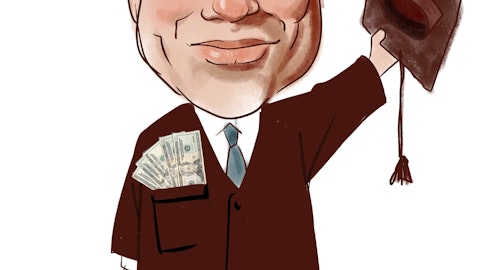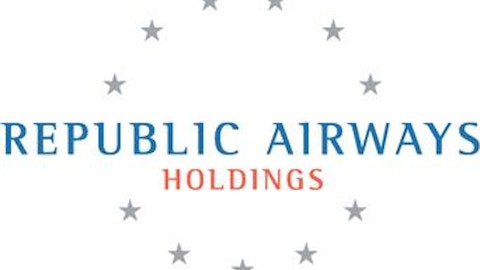Competition
The airline industry is notoriously competitive and cutthroat. The two main competitors to each airline are United Continental Holdings Inc (NYSE:UAL) and Southwest Airlines Co. (NYSE:LUV). United Continental Holdings Inc (NYSE:UAL) is a chief competitor in international flights, and Southwest Airlines Co. (NYSE:LUV) is a very tough competitor domestically.
The merger between United Airlines and Continental ended up being tougher than the company expected. In the first full year after the merger, the airline lost $723 million when it had forecast profits to be 589 million. Merger-related problems lead United Continental Holdings Inc (NYSE:UAL) to being ranked the worst airline in the world in 2012.
The outlook for this year is much better. Fitch Ratings recently revised its outlook on United citing progress the company has made in merger integration, expectations for improving profitability, debt reduction and its leading position in many markets.
United is also stocking up on new planes as it looks to replace its oldest aircraft and expand overseas. United is the first U.S. carrier to fly The Boeing Company (NYSE:BA)‘s new 787 Dreamliner. United will use the new 787 on lucrative non-stop routes to Asia from the U.S. By being the first U.S. carrier with the 787, United can take advantage of the plane’s abilities to fly farther, faster, and more efficiently than similar-sized aircraft. United now has six Dreamliners in service and 55 on-order.
Southwest Airlines Co. (NYSE:LUV) is the low-cost, no-frills carrier that Americans love to fly on. To give you an idea of how well-run Southwest Airlines Co. (NYSE:LUV) is, consider that seven years ago Southwest Airlines Co. (NYSE:LUV) did not have a single flight going into Denver. Today, Southwest Airlines Co. (NYSE:LUV) serves the most local passengers in Denver, which is one of the primary hubs for competitor United Continental Holdings Inc (NYSE:UAL).
What intrigues me the most about Southwest is that CEO Gary Kelly has signaled his intentions to go international. To do so, Southwest is paying for a $156 million international terminal at Houston’s Hobby Airport. So far, the company is keeping quiet on its plans, but a move into the international market would be a game changer and I’m sure has the other airlines nervous. It does make sense for Southwest to target the international market because four airlines will end up controlling 90% of the U.S. domestic market. For Southwest to continue growing, international is the next logical step.
Foolish assessment
Soros and Tepper have made big bets on Delta and US Airways Group Inc (NYSE:LCC). I think the overall airline sector looks better now than at any point in its history. The market has consolidated and what’s left are a few very strong players. Fuel prices have stabilized and airline travel is up. All of this helps boost the top and bottom lines for the airline stocks and explains the strong price action in the stocks.
Mark Yagalla has no position in any stocks mentioned. The Motley Fool recommends Southwest Airlines. Mark is a member of The Motley Fool Blog Network — entries represent the personal opinion of the blogger and are not formally edited.
The article Fly the Friendly Skies With George Soros and David Tepper originally appeared on Fool.com is written by Mark Yagalla.
Copyright © 1995 – 2013 The Motley Fool, LLC. All rights reserved. The Motley Fool has a disclosure policy.




